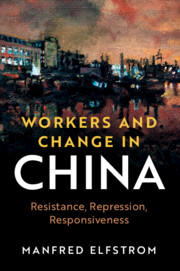Book contents
- Workers and Change in China
- Cambridge Studies in Contentious Politics
- Workers and Change in China
- Copyright page
- Dedication
- Contents
- Figures
- Maps
- Tables
- Acknowledgments
- 1 Introduction
- 2 Recipes for Resistance
- 3 Bureaucratic Incentives
- 4 Orthodox Control
- 5 Risk-Taking Control
- 6 Increased Repressive and Responsive Capacity
- 7 Bottom-Up versus Top-Down Change
- 8 Conclusion
- Appendices
- References
- Index
- Series page
1 - Introduction
Published online by Cambridge University Press: 14 January 2021
- Workers and Change in China
- Cambridge Studies in Contentious Politics
- Workers and Change in China
- Copyright page
- Dedication
- Contents
- Figures
- Maps
- Tables
- Acknowledgments
- 1 Introduction
- 2 Recipes for Resistance
- 3 Bureaucratic Incentives
- 4 Orthodox Control
- 5 Risk-Taking Control
- 6 Increased Repressive and Responsive Capacity
- 7 Bottom-Up versus Top-Down Change
- 8 Conclusion
- Appendices
- References
- Index
- Series page
Summary
They had clocked punishingly long hours – eleven a day, six days a week, more during peak production periods – and been verbally and physically abused, eaten disgusting cafeteria food lacking the nutrition needed to sustain them, and slept fifteen people to a room in sweltering summers. Their earnings before overtime had been the local legal minimum at the time, no more, no less: US$54 per month. Fees for housing and meals, which totaled $30 per month, were deducted from this. There was little money left over to buy clothes and toiletries, let alone send home to help a sibling get through school or an ailing parent get medical care. Managers, who had come under scrutiny from foreign clients brandishing corporate codes of conduct, had put forward a plan to increase the number of rest days per month. However, the condition for this seeming generosity was that more overtime had to be worked on weekdays. Because weekday overtime paid less than weekend overtime, earnings were cut by another $12. Then, when payday arrived, even this reduced salary was inexplicably delayed.
Information
- Type
- Chapter
- Information
- Workers and Change in ChinaResistance, Repression, Responsiveness, pp. 1 - 20Publisher: Cambridge University PressPrint publication year: 2021
